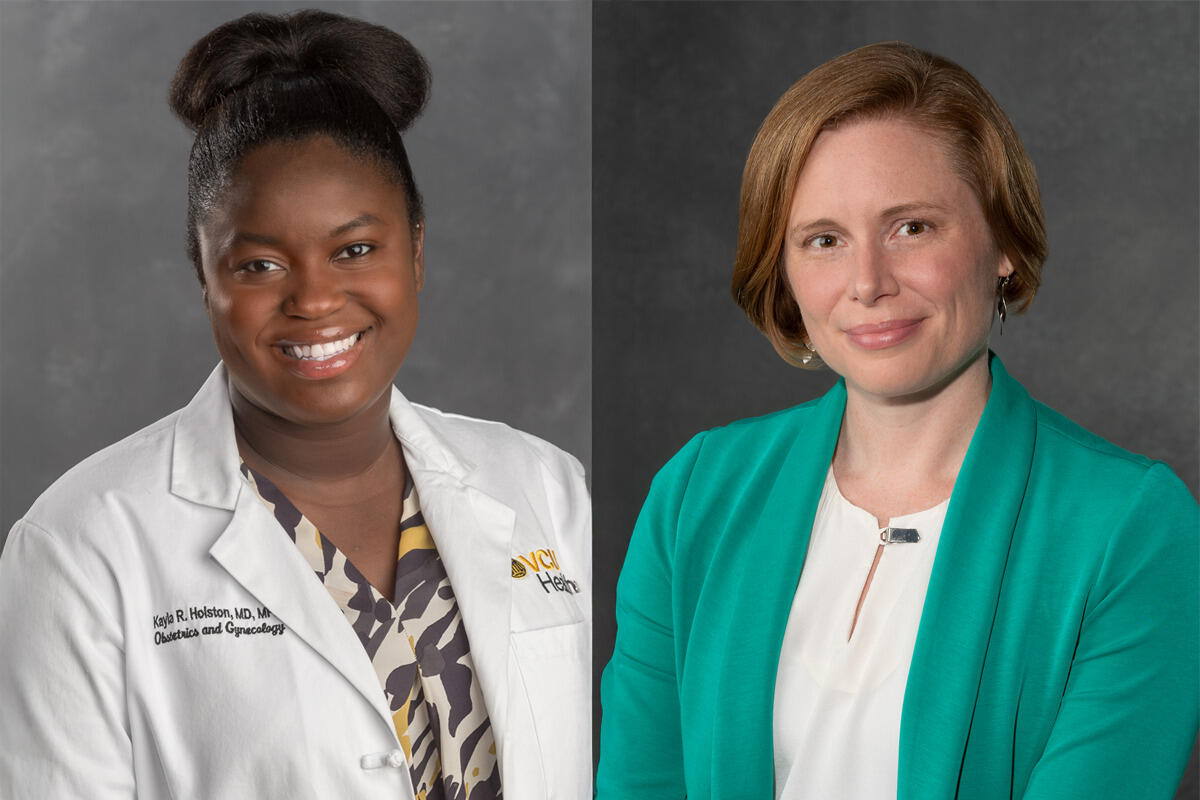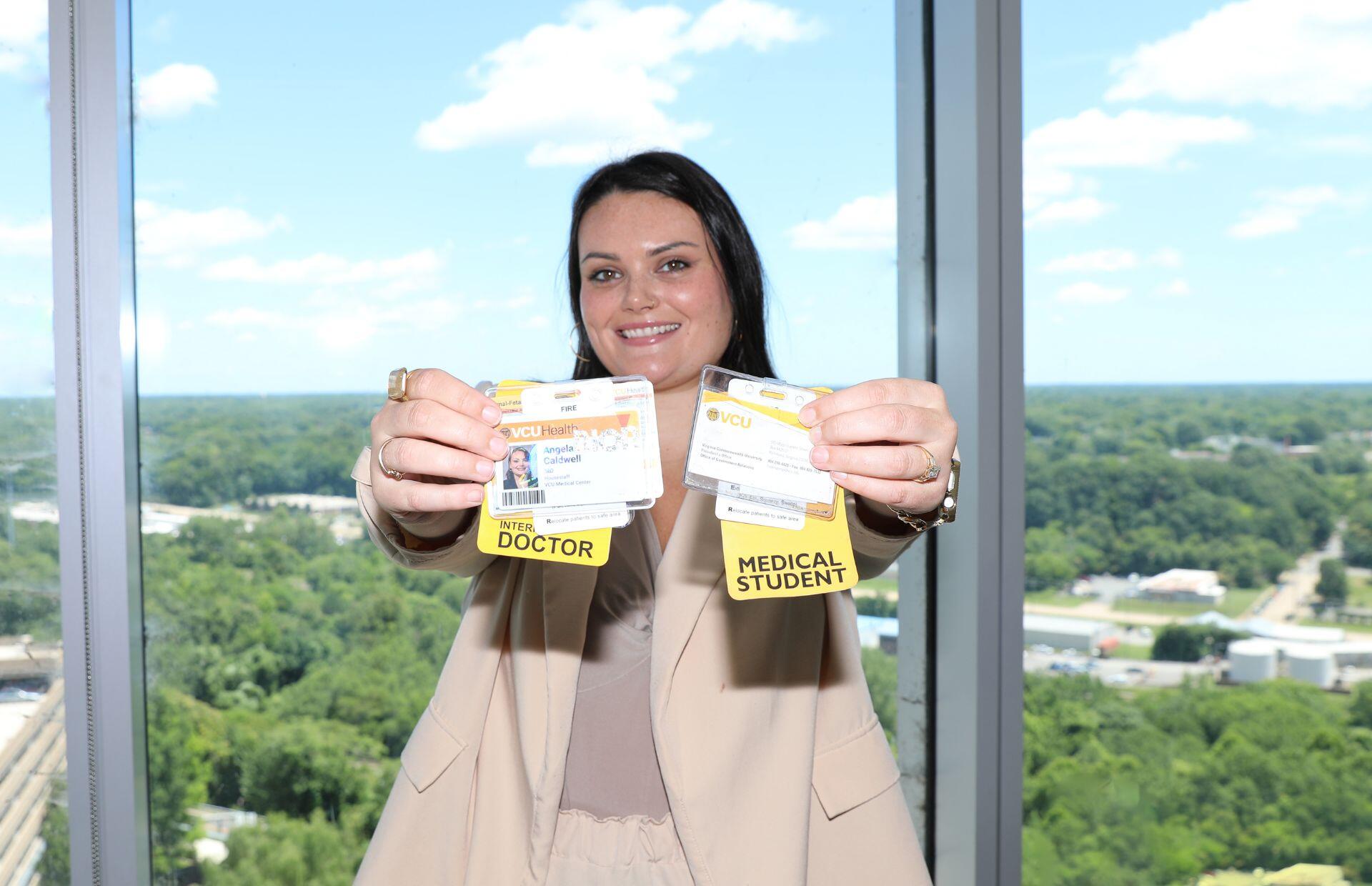Learning at the intersection of OB-GYN and addiction treatment
By Grace Grace McOmber
VCU School of Medicine
Kayla Holston, M.D., knew she wanted to be an OB-GYN after her first clinical rotation. As a third-year student at Sidney Kimmel Medical School, she loved working with Philadelphia’s patient population, especially the young Black women she met.
“A lot of them didn’t know a lot about their bodies and didn’t always have someone they could confide in,” Holston, now in Virginia Commonwealth University’s OB-GYN residency program, said. “It was a unique opportunity to participate in the intimate parts of their lives and a privilege to be able to chat and be that person for them.”
That first year of Holston’s clinical rotations, 2022, was also the year Philadelphia recorded over 1,400 opioid overdose deaths, the highest number to date. Black Philadelphians were hit especially hard, with a 20% increase in unintentional overdose deaths, the highest of any demographic.
The experience inspired Holston to combine her interests and complete her residency training at an institution that treated OB-GYN patients with substance use disorder. When the Hampton, Virginia native learned of OB MOTIVATE, VCU Health’s integrated OB-GYN and addiction treatment clinic, she knew it was the right fit. Now, Holston is one of a growing number of trainees who were drawn to the VCU School of Medicine for the opportunity to provide care for this specific demographic.
“It’s a patient population that doesn’t always get the empathy that they deserve, and I wanted to work with people that could provide that empathy.” Holston said. “VCU has a framework for treatment that works.”
Changing the narrative
The OB MOTIVATE clinic was founded in 2019, two years after the launch of the larger Multidisciplinary Outpatient Intensive Addiction Treatment (MOTIVATE), an outpatient addiction medicine clinic housed under the Department of Psychiatry. Caitlin E. Martin, M.D., an associate professor in the Department of OB-GYN, noticed an uptick in pregnant and postpartum patients seeking treatment at MOTIVATE. In almost six years of operation, Martin said the clinic has quadrupled its activities, and takes care of upwards of 200 patients most months.
“There’s a mantra in addiction treatment, ‘You build it, they come,’” Martin said. “Some people don’t think there’s a need for these clinics because drug use disorders are often very hidden, but if you build a clinic anywhere, you will have a patient population.”
Instances of pregnant women with substance use disorders have increased significantly over the past 20 years. Overdose is a leading cause of pregnancy-related mortality, with most deaths occurring in the year after delivery. Untreated substance use disorders during pregnancy have been linked with higher rates of severe maternal morbidity, preterm birth and complications due to neonatal abstinence syndrome, a condition in which newborns experience withdrawal from substances that were used during pregnancy.
One of the most prevalent roadblocks for pregnant patients seeking care for substance use disorders is the fear, and experience, of stigmatization from providers. One remedy, Martin said, is to introduce medical students and residents to an empathy-based model of treatment early in their medical training.

Using her background in research, Martin and her team developed a curriculum for first-year OB-GYN residents, third-year medical students on their OBGYN rotation and an elective for fourth-year medical students to learn about treating pregnant and postpartum patients with addiction. The goal is to introduce trainees and students to a highly specific patient population that they might otherwise not encounter until later in their careers and ensure that more emerging physicians gain the knowledge and compassion needed to care for these patients.
“Compared to my clinical research, it is a relatively smaller study, but I feel that it is the one that has had the most impact,” Martin said. “I get requests from residents and attendings around the world asking to use this data to implement a program at their school.”
During their first year of residency, OB-GYN interns rotate into the OB MOTIVATE clinic once a week while on clinic rotations and see new and returning pregnant and postpartum patients for their obstetric visits. For residents like Kayla Holston, M.D., early exposure to SUD patients allows them to practice working with a patient population with specific needs.
“Some patients don’t have much health literacy and can sometimes be going through active withdrawal,” Holston said. “For example, someone newly pregnant and in active withdrawal might not be in the right headspace to remember when their last menstrual period was. Even in a busy hospital, we have to adjust to patients' needs in that moment.”
Preparing future physicians
For Rion Caldwell, M.D., the issue is personal. Caldwell, a Class of 2025 graduate who will join VCU's OB-GYN residency program this summer, grew up in Wise County, Virginia, a community hit hard by the opioid epidemic. Before medical school, she worked for a comprehensive harm reduction site in Southwest Virginia, a program under the Virginia Department of Health that provides services like a needle exchange program for people with SUD.
Motivated by her personal and professional exposure to addiction, Caldwell sought out a medical school and a specialty where she could build on that experience — and quickly found her place in OB-GYN.
“OB-GYN is so special because you get to go on these life-changing journeys with patients,” Caldwell said. “I think OB MOTIVATE, and VCU's department at large, is great at preparing students to feel more comfortable as physicians.”

During her M2 year, Caldwell began working alongside Martin to develop an interactive, virtual module course for M3s participating in the OB MOTIVATE elective. The long-term goal, she said, is to make the curriculum available to students more generally, exposing more future physicians to the needs of patients with OUD and addressing stigma and bias early on.
“Stigma against substance use disorder is a very ingrained thing; people might not even know when they’re engaging in it,” Caldwell said. “I think having a more general training would be beneficial to all medical students, because, odds are, they’ll encounter substance use disorder at some point, regardless of their specialty.”
This story was originally published on the VCU School of Medicine’s website.
Subscribe to VCU News
Subscribe to VCU News at newsletter.vcu.edu and receive a selection of stories, videos, photos, news clips and event listings in your inbox.
Latest Student success
- Family ties, including a father’s illness, propel a son’s research journeyVCU biology major Nic Carwile finds special resonance in his prestigious summer internship in Germany.
- Alexis Washington is sporting experience from the TV studioFramed by summer internships, the broadcast journalism student will help VCU Athletics in the fall.
- What to wear at VCU? Depends on what you’re studyingTwo VCUarts students who styled looks representing wide-ranging academic majors share insights from the process – and some fashion advice, too.
- Nursing students use art to explore psychiatric-mental health topics in innovative final projectAs part of a class project, students made art to explore complex mental health topics, turning classroom concepts into powerful visuals rooted in empathy and clinical understanding.
- How did VCU students help Virginia protect health data? By making ‘noise.’The School of Business team partnered with the behavioral health department to facilitate research while safeguarding individual privacy.
- Love in a packing box? VCU Brandcenter students collaborate with advertising pros.The production master class helps bring spec scripts to life in partnership with Richmond creative companies.






